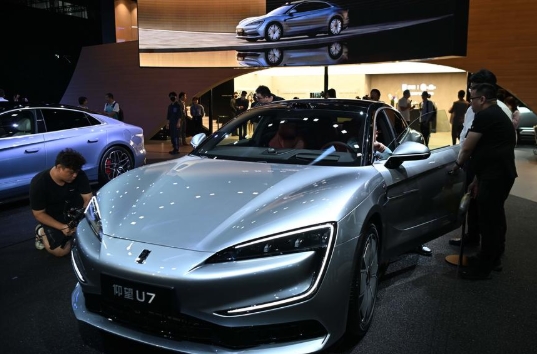Chinese NEVs scale new heights amid green shift, tech advancements

This photo shows a Yangwang U7 of BYD at the 22nd Guangzhou International Automobile Exhibition at the China Import and Export Fair Complex in Guangzhou, south China's Guangdong Province, Nov. 15, 2024. (Xinhua/Deng Hua)
Despite facing challenges, China's new energy vehicle (NEV) manufacturers have made significant strides in 2024 and are poised to gain continued momentum as carbon reduction targets drive global demand for clean-energy vehicles.
For Chinese NEV manufacturers, the most significant milestone of the year came on Nov. 14, when the country's annual NEV output surpassed 10 million for the first time, making China the first country globally to achieve this feat.
"The achievement holds tremendous historical significance and is the result of the concerted efforts of Chinese-branded carmakers," said Xin Guobin, vice minister of industry and information technology.
According to industry insiders, this milestone further solidifies China's position as the world's largest producer and seller of NEVs, marking the beginning of a new phase of steady growth for the auto industry in the world's second-largest economy.
A YEAR OF BREAKTHROUGHS
China has topped the global list for nine consecutive years in both NEV output and sales, contributing to over 60 percent of the world's NEV output and sales in 2023.
The robust sales performance has continued into 2024, with China's carmakers selling more than 11.26 million NEVs in the first 11 months, a 35.6 percent increase compared to the previous year, according to the China Association of Automobile Manufacturers (CAAM).
In July, China's NEV sector reached another historic milestone, with the NEV retail penetration rate exceeding 50 percent. This figure indicates that NEVs have overtaken internal combustion engine vehicles as the preferred choice among car buyers.
Cui Dongshu, secretary general of the China Passenger Car Association (CPCA), attributed this year's NEV sales growth in part to strong policy support.
According to government policies, consumers trading in an old car for an NEV are entitled to a 20,000 yuan (about 2,782 U.S. dollars) subsidy, higher than the 15,000 yuan received by those opting for a new fuel-powered car.
Chinese-branded cars have also seen significant growth this year. In October, the share of such new energy passenger vehicles in total car sales reached a record 70.1 percent, further highlighting the strong competitiveness of domestic brands.
Sales data from China's leading NEV makers confirm their increasingly strong foothold. In October, NEV giant BYD shattered the monthly sales record for Chinese auto companies in terms of NEV sales, delivering an astounding 502,657 units and setting a new monthly sales record for global car manufacturers.
As of the end of November, BYD, Xiaomi and Leapmotor have all announced that they have met full-year sales targets ahead of schedule.
Exports have remained a strong growth driver. From January to November, China shipped a total of 1.86 million NEVs overseas, an increase of 13 percent from a year ago, with Belgium, Brazil and the United Kingdom being the top three export destinations, according to Cui.
Although export growth to Europe has slowed due to the imposition of additional tariffs, Cui forecasts a rebound in the future as the market gradually adjusts to the fallout of the tariff hikes.
For the entirety of 2024, NEV sales are expected to exceed 13 million units, pushing the country's total auto sales to over 31 million units, said Chen Shihua, deputy secretary-general of the CAAM.
GREAT POTENTIAL AHEAD
Heading into 2025, China's NEV manufacturers will encounter a plethora of growth opportunities from both domestic and overseas markets, according to analysts.
At the Central Economic Work Conference held in early December, the Chinese leadership reiterated the need to ramp up the green transition in economic and social development, outlining measures to better track carbon footprints and curb emissions.
Meanwhile, China has begun to tighten its use of fossil fuels, pledging in August, through a guideline, to increase the share of non-fossil energy in total energy consumption to around a quarter by 2030.
Globally, electric vehicles (EVs) are expected to account for around 45 percent of car sales in 2030 and 55 percent in 2035, according to a recent article on the International Energy Agency website.
The article stated that a crucial factor in the growth pace across markets will be the affordability of EVs, citing China as an example where affordable models have boosted the mass adoption of EVs.
Following a series of landmark achievements this year, restructuring and innovation will be the major themes for China's NEV makers in 2025, according to analysts.
Chinese carmakers now face intense competition in the market, where the speed and effectiveness of innovation are key to standing out.
Automakers should prioritize technological innovation, drive industrial progress through technological advancements, and focus on industrial upgrading and high-quality development, said Su Bo, director of the national intelligent manufacturing expert committee.
Editor:伏娅敏
